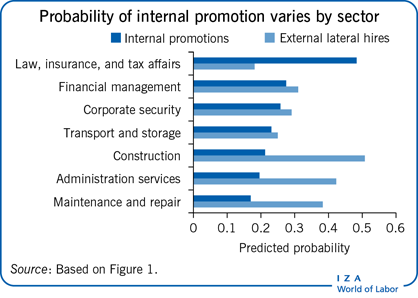Elevator pitch
When an employer fills a vacancy with one of its own workers (through promotion or horizontal transfer), it forgoes the opportunity to fill the position with a new hire from outside the firm. Although firms use both internal and external hiring methods, they frequently favor insiders. Internal and external hires differ in observable characteristics (such as skill levels), as do the employers making the hiring decisions. Understanding those differences helps employers design and manage hiring policies that are appropriate for their organizations.

Key findings
Pros
Internal hiring has low downside risk because there is little uncertainty about productivity, so a disastrous hire is unlikely.
Internal hiring gives workers strong incentives because a smaller pool of competitors means that effort is more likely to be rewarded with promotion.
Internal hiring encourages workers (who anticipate long careers with the firm) to develop specialized knowledge and skills.
A firm can productively reallocate its workforce across job levels through internal hiring.
Internal hiring at one job level creates new vacancies, strengthening incentives at lower levels.
Cons
Internal hiring has less upside potential than external hiring because there is little uncertainty about an applicant’s star potential.
A firm’s workers might grow complacent and lazy without the prospect of at least some external hiring.
Internal hiring limits the infusion of new knowledge and ideas into the firm.
Internal hiring restricts the size of the applicant pool, potentially shutting out some stars.
The new vacancies created by an internal hiring policy are associated with additional recruitment, screening, orientation, and training costs.